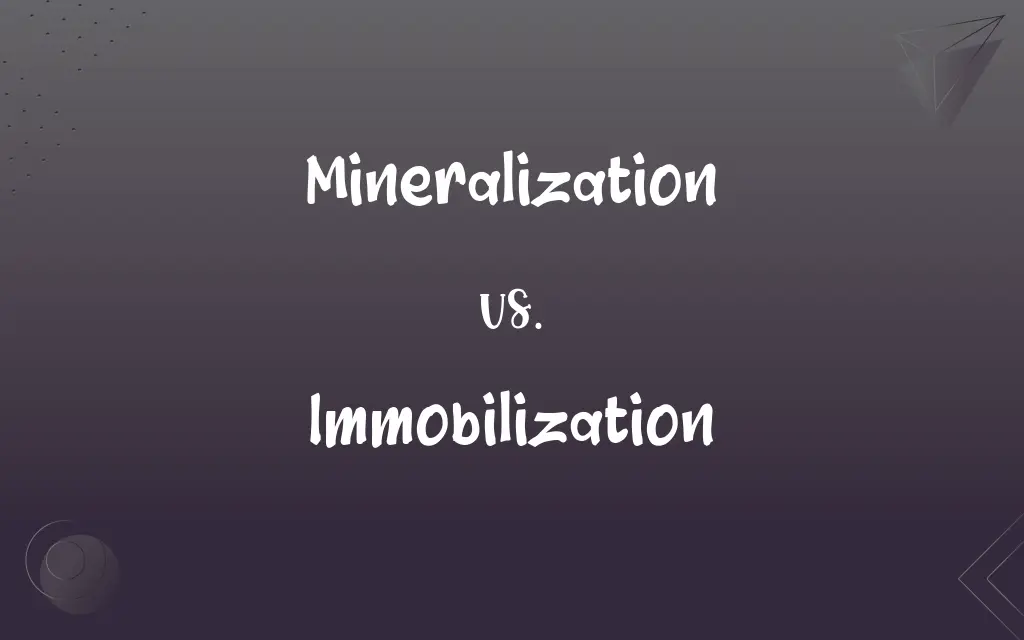Mineralization vs. Immobilization: What's the Difference?
Edited by Aimie Carlson || By Janet White || Updated on September 18, 2023
Mineralization refers to the process by which organic matter is converted into inorganic minerals, often by microbial action. Immobilization is the conversion of inorganic nutrients into organic forms, essentially making them unavailable for plant uptake.

Key Differences
Mineralization and immobilization are terms often used in environmental science, particularly in soil science and ecology, to describe contrasting processes related to nutrient cycling. Mineralization involves the decomposition of organic matter, converting it into inorganic forms like ammonium or nitrate. This process usually happens through microbial activity and serves to release essential nutrients back into the soil. Immobilization, on the other hand, is the incorporation of inorganic nutrients into the cells of microorganisms, essentially rendering these nutrients unavailable for plant uptake.
While mineralization makes nutrients readily available for plants, immobilization locks them away in a form that is not readily accessible. Mineralization is often viewed as beneficial for plant growth and health, providing essential minerals like nitrogen, phosphorus, and potassium in a form that plants can absorb. Immobilization tends to be seen as an undesirable process from an agricultural standpoint, as it reduces the pool of available nutrients in the soil.
The kinetics and occurrence of mineralization and immobilization are influenced by a variety of factors, including soil pH, temperature, moisture levels, and microbial activity. When conditions are favorable for microbial activity, the rate of mineralization tends to increase. Conversely, during periods of stress or limited resources, microorganisms may resort to immobilization to conserve nutrients.
In terms of grammatical usage, both "mineralization" and "immobilization" serve as nouns and are used to describe specific processes. They are also used as verbs, "to mineralize" and "to immobilize," to denote the action of undergoing or causing these processes. However, they are not interchangeable due to their opposing mechanisms in nutrient cycling.
Comparison Chart
Process
Conversion to inorganic minerals
Conversion to organic forms
ADVERTISEMENT
Effect on Nutrients
Makes nutrients available
Makes nutrients unavailable
Grammatical Role
Used as a noun and a verb
Used as a noun and a verb
Favorable Conditions
High microbial activity, pH, etc.
Stressful conditions, low resources
Viewpoint in Agriculture
Generally beneficial
Generally undesirable
Mineralization and Immobilization Definitions
Mineralization
The deposition of minerals in tissues or cells.
Bone mineralization is crucial for skeletal strength.
ADVERTISEMENT
Immobilization
The act of making something immobile or unmovable.
The immobilization of the broken limb aided in healing.
Mineralization
The act of making something mineral or inorganic.
Mineralization is a key part of the earth's nutrient cycle.
Immobilization
The conversion of inorganic nutrients into organic forms.
Immobilization of nutrients in the soil can limit plant growth.
Mineralization
A geological process where minerals are introduced into a rock.
The mineralization of the rock indicated valuable ore deposits.
Immobilization
The prevention of a substance's migration or dispersion.
Immobilization of pollutants is crucial for environmental safety.
Mineralization
Conversion of a substance to a simpler, stable, inorganic form.
Microbial mineralization helps break down complex organic compounds.
Immobilization
The restriction of movement or activity.
The immobilization of the enzyme prevented the chemical reaction.
Mineralization
The process of converting organic matter into inorganic minerals.
Mineralization in the soil helps release essential nutrients for plant growth.
Immobilization
To render immobile.
Mineralization
To convert to a mineral substance; petrify.
Immobilization
To fix the position of (a joint or fractured limb), as with a splint or cast.
Mineralization
To transform a metal into a mineral by oxidation.
Immobilization
To impede movement or use of
Severe weather immobilized the rescue team.
Mineralization
To impregnate with minerals.
Immobilization
To withdraw (specie) from circulation and reserve as security for other money.
Mineralization
To develop or hasten mineral formation.
Immobilization
To convert (floating capital) into fixed capital.
Mineralization
To collect or study minerals.
Immobilization
The act or process of preventing a thing from moving.
The broken bones were able to heal, thanks to the immobilization of her leg in a cast.
Mineralization
A form of fossilization in which the organic parts of an organism are replaced by minerals.
Immobilization
(soil science) The process in which organic soil matter is decomposed and absorbed by microorganisms, and thus not available to plants.
Mineralization
The breakdown of organic matter in the soil to form soluble inorganic compounds.
Immobilization
Fixation (as by a plaster cast) of a body part in order to promote proper healing;
Immobilization of the injured knee was necessary
Mineralization
(medicine) The deposition of calcium salts in abnormal parts of the skeleton.
Immobilization
The act of limiting movement or making incapable of movement;
The storm caused complete immobilization of the rescue team
Mineralization
The addition of minerals to water to make a mineral water.
Immobilization
The fixation of substances to a solid matrix.
Immobilization techniques are used in water treatment plants.
Mineralization
The process of mineralizing, or forming a mineral by combination of a metal with another element; also, the process of converting into a mineral, as a bone or a plant.
Mineralization
The act of impregnating with a mineral, as water.
Mineralization
The conversion of a cell wall into a material of a stony nature.
FAQs
Are Mineralization and Immobilization Opposites?
Yes, they are opposite processes in the context of nutrient cycling.
What is Immobilization?
Immobilization is the conversion of inorganic nutrients into organic forms, making them unavailable for plant uptake.
Is Mineralization Beneficial for Plants?
Generally, mineralization is beneficial as it makes nutrients available for plants.
Can Mineralization Occur in Water?
Yes, mineralization can occur in aquatic ecosystems as well.
Is Mineralization a Geological Term?
Mineralization can refer to geological processes involving the introduction of minerals into rocks.
Are Mineralization and Immobilization Verbs?
Both terms can be used as verbs: to mineralize and to immobilize.
What is Mineralization?
Mineralization is the conversion of organic matter into inorganic minerals, often facilitated by microbes.
Is Immobilization Bad for Plants?
Immobilization is generally undesirable in agriculture as it locks away essential nutrients.
Is Immobilization Related to Pollution Control?
Immobilization can be used to fix pollutants to a solid matrix.
What Causes Immobilization?
Stressful conditions and low resources can lead to immobilization.
What Factors Influence Mineralization?
Factors like soil pH, temperature, and microbial activity can influence mineralization.
How Are Mineralization and Immobilization Measured?
Both processes can be measured through soil and water testing methods.
How Are Mineralization and Immobilization Related to Microbes?
Microbial activity often facilitates both mineralization and immobilization.
Do Mineralization and Immobilization Happen in All Soils?
Both processes can occur in a variety of soil types but are influenced by local conditions.
Is Immobilization Only a Biological Term?
No, immobilization can also refer to physical or chemical fixation processes.
About Author
Written by
Janet WhiteJanet White has been an esteemed writer and blogger for Difference Wiki. Holding a Master's degree in Science and Medical Journalism from the prestigious Boston University, she has consistently demonstrated her expertise and passion for her field. When she's not immersed in her work, Janet relishes her time exercising, delving into a good book, and cherishing moments with friends and family.
Edited by
Aimie CarlsonAimie Carlson, holding a master's degree in English literature, is a fervent English language enthusiast. She lends her writing talents to Difference Wiki, a prominent website that specializes in comparisons, offering readers insightful analyses that both captivate and inform.































































